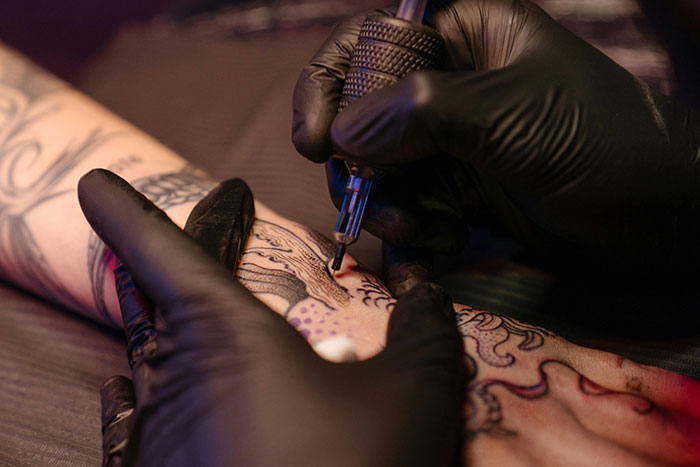
Lymphoma Expert Reacts To New Study Linking Tattoos To Cancer
Interview With ExpertA new study suggesting that tattoos could be a risk factor for cancer went viral last weekend, leaving plenty of people permanently inked in a panic. However, a medical expert who identified himself as a “heavily tattooed person” said there was nothing to worry about, for now.
Lund University in Sweden caused quite the ruckus on social media when it published a new study on Friday (May 24) that suggested that tattoos could be a risk factor for cancer in the lymphatic system, or lymphoma.
- A new study suggested tattoos could be a risk factor for lymphoma, causing social media uproar.
- The study from Lund University included 11,905 participants, finding a 21% higher lymphoma risk in tattooed individuals.
- Lymphoma expert Dr. Timothy Pearman was not worried about the study's findings and called for more research.
On X (formerly known as Twitter), people were quick to share their discontentment, as a user wrote: “Breaking news everything is killing us! Who knew ?”
A person commented: “Amazing how everything is now linked to an increased risk of cancer.
“I am 3 times vaccinated, dead man walking.
“High probability of cancer or heart disease or blood clots.
“But no it will be the tattoo I had do 50 years ago that I should go and see my doctor about.”
A viral study from Lund University suggesting tattoos may increase lymphoma risk caused alarm
Image credits: cottonbro studio/Pexels
Someone else penned: “What a load of BS, tattooing has been around since the 4th millennium BC, and they’ve only just come up with that.”
“Imagine being covered in them,” an observer noted.
A separate individual chimed in: “Damn, a lot of you are screwed. Those tattoo sleeves won’t be so cool soon.”
Christel Nielsen, the researcher at Lund University who led the study, said: “We have identified people diagnosed with lymphoma via population registers.
Image credits: Åsa Hansdotter/Lund University
“These individuals were then matched with a control group of the same sex and age, but without lymphoma.
“The study participants answered a questionnaire about lifestyle factors to determine whether they were tattooed or not.”
In total, the entire study included 11,905 people, the university explained. Of these, 2,938 people had lymphoma when they were between 20 and 60 years old.
Among them, 1,398 people answered the questionnaire, while the number of participants in the control group was 4,193. In the group with lymphoma, 21 percent were tattooed (289 individuals), while 18 percent were tattooed in the control group without a lymphoma diagnosis (735 individuals).
However, a tattooed medical professional urged caution and highlighted the need for further research
Image credits: Sebastian Kaulitzki/stock.adobe.com
Christel said: “After taking into account other relevant factors, such as smoking and age, we found that the risk of developing lymphoma was 21 percent higher among those who were tattooed.
“It is important to remember that lymphoma is a rare disease and that our results apply at the group level.
“The results now need to be verified and investigated further in other studies and such research is ongoing.”
A hypothesis that Christel’s research group had before the study was that the size of the tattoo would affect the lymphoma risk, the University wrote.
Image credits: Letícia Lua/Pexels
Researchers thought that a full-body tattoo might be associated with a greater risk of cancer compared to a small butterfly on the shoulder, for example. Unexpectedly, the area of the tattooed body surface turned out not to matter.
Christel said: “We do not yet know why this was the case.
“One can only speculate that a tattoo, regardless of size, triggers a low-grade inflammation in the body, which in turn can trigger cancer.
“The picture is thus more complex than we initially thought.”
Lund University suggests that tattoos may cause cancer because the ink can trigger a low-grade inflammation in the body
Image credits: Annie Spratt/Unsplash
Most people get their first tattoo at a young age, which means that they are exposed to tattoo ink for a large part of their life, according to the university.
Even so, research has only scratched the surface of the long-term health effects of tattoos.
“We already know that when the tattoo ink is injected into the skin, the body interprets this as something foreign that should not be there, and the immune system is activated,” Christel said. “A large part of the ink is transported away from the skin, to the lymph nodes where it is deposited.”
The research group will now proceed with studies of whether there is any association between tattoos and other types of cancer, the university said.
Image credits: Lund University
The Swedish scientists also want to do further research on other inflammatory diseases to see if there is a link to tattoos.
Christel said: “People will likely want to continue to express their identity through tattoos, and therefore it is very important that we as a society can make sure that it is safe.
“For the individual, it is good to know that tattoos can affect your health and that you should turn to your health care provider if you experience symptoms that you believe could be related to your tattoo.”
Lymphoma is a type of hematologic cancer that originates in the lymph nodes of the body, so it affects our immune system, Dr Timothy Pearman, Director of Supportive Oncology at the Robert H. Lurie Comprehensive Cancer Center explained.
Dr Timothy Pearman told Bored Panda that as a “heavily tattooed person” himself, he wasn’t too worried
“You can manage the #cancer for many years or decades and still have a good quality of life.” Timothy Pearman, PhD, with @LurieCancer@NorthwesternMed stops by @cbschicago to discuss the importance of #NationalCancerSurvivorMonth. https://t.co/gGkE2zV9ws
— NM Media Relations (@NMHC_News) June 7, 2023
The expert, who is also a professor at the Department of Medical Social Sciences and Psychiatry & Behavioral Sciences at the Northwestern University Feinberg School of Medicine, stated that the risk factors for developing lymphoma are largely unknown, though it is known that individuals in certain “high risk” professions, as well as individuals with a compromised immune system, are at increased risk of developing lymphoma.
According to Lymphoma Action, working in a job where you’re exposed to high levels of industrial chemicals, solvents, weedkillers, and insecticides is a possible risk factor for developing lymphoma.
As a result, professions at risk include crop farming, hairdressing, painting and decorating, or working in the rubber manufacturing industry.
“I think this research from Sweden is scientifically valid, but a few caveats are important to note,” Dr Pearman told Bored Panda in an email.
Old women with tattoos characteristic for Croatian Catholics in Bosnia, 1930s – 1940s pic.twitter.com/rKwGFx49wQ
— History Defined (@historydefined) October 31, 2023
He clarified: “First, the rate of people tattooed was 21% in lymphoma patients and 18% in “normal controls” (people not diagnosed with lymphoma).
“In a study as large as this one (over 11,000 participants), this 3% difference in rates of tattooing could simply be due to how statistical analysis works.
“As the number of study participants increases, it becomes more likely that even minuscule changes between groups will show up as statistically significant, even if they don’t truly have much clinical significance.
“Second, the authors note that when they did a literature review of tattooing and lymphoma they found only one study that had investigated this.
“Further, this study was underpowered (not enough tattooed subjects) and so didn’t find any significant risk to tattoos.”
The board-certified clinical health psychologist concluded: “As a heavily tattooed person myself, as well as from a scientific perspective, I’m not worried about the impact of tattoos on lymphoma risk and think much more research would need to be done before assuming that tattooing has any impact whatsoever on cancer risk.”
Poll Question
Thanks! Check out the results:
Explore more of these tags
Don't forget that going to the beach a third time increases your risk of getting shot by a dog carrying a handgun by 50%!!!!!!!!! Also don't forget that a large increase in a tiny percent is still a tiny percent.
Because the media needs some sort of fear-mongering headline to get more clicks/eyes on an article/video. It's basically like clickbait on a YouTube video.
Load More Replies...After reading the study, I think OP is confusing different 21%. There are 21 vs 18% in the initial responding groups, but the 21% increase in risk seems to be unrelated to those numbers, but rather be the risk increase after all confounding factors are accounted for. A different 21%, abeit still a low actual number as not many get lymphoma.
Did you notice they purposefully excluded groups that were less likely to have tattoos, but not cancer? The lowest age included was 20 but kids can and do get cancer they are also not likely to have tattoos. This is a flawed study as they skewed the data before they even started.
Load More Replies...Don't forget that going to the beach a third time increases your risk of getting shot by a dog carrying a handgun by 50%!!!!!!!!! Also don't forget that a large increase in a tiny percent is still a tiny percent.
Because the media needs some sort of fear-mongering headline to get more clicks/eyes on an article/video. It's basically like clickbait on a YouTube video.
Load More Replies...After reading the study, I think OP is confusing different 21%. There are 21 vs 18% in the initial responding groups, but the 21% increase in risk seems to be unrelated to those numbers, but rather be the risk increase after all confounding factors are accounted for. A different 21%, abeit still a low actual number as not many get lymphoma.
Did you notice they purposefully excluded groups that were less likely to have tattoos, but not cancer? The lowest age included was 20 but kids can and do get cancer they are also not likely to have tattoos. This is a flawed study as they skewed the data before they even started.
Load More Replies...
 Dark Mode
Dark Mode 

 No fees, cancel anytime
No fees, cancel anytime 






















































35
17